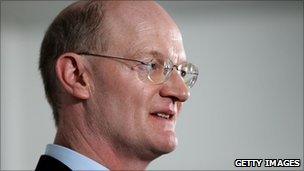Researchers plan for deeper cuts to science budget
- Published

David Willetts plans for security and stability in research funding
UK science funding bodies have learned that they will have to absorb cuts of 41% to their capital expenditure.
This capital expenditure is money spent on building, maintainance or equipment.
These cuts are on top of the 10% real terms cut announced by the Chancellor George Osborne during the spending review in October.
The news emerged as the science minister David Willetts announced how the science budget would be allocated to research funding bodies.
In a written ministerial statement, Mr Willetts said "this Government is committed to efficiency, prioritisation and reform. We shall delay capital investment to maximise investment in research projects and in people undertaking research".
The government has said that it will shield medical research and some prestige projects, such as the Diamond Light Source in Oxfordshire and the proposed UK Centre for Medical Research and Innovation in London.
Subscriptions to international programmes, such as Cern and the European Southern Observatory are to be maintained. The science budget is also ring-fenced for the next four years, a factor that provides "stability, security and the ability to plan", according to Mr Willetts.
Even so, funding bodies are likely to have to reduce research grants and make job cuts. The cutback on capital funding will also mean that fewer new projects are likely to be embarked upon.
Tricky years ahead
According to Imran Khan, director of the Campaign for Science and Engeering (Case) the shortfall in capital expenditure will have to be found from funds that would otherwise have been spent on employing researchers and funding their research.
"A lot of so-called 'capital' expenditure' can't be cut back on - it includes maintenance, and other long-term commitments. The money will simply have to come from scientific grant budgets," he told ҙуПуҙ«ГҪ News.
"The allocations confirm that UK science and engineering faces four very tricky years ahead. While some of our international competitors are looking to the future, British research will be busy retrenching."
The Chancellor George Osborne told the House of Commons in October that he would freeze the annual science budget for the next four years. Although this amounted to a real terms cut of 10%.
It was welcomed by the scientific community and described by the Prime Minister, David Cameron, as "a good outcome for science".
Bob Ward, of the Grantham Research Institute on Climate Change said that the Chancellor's announcement was misleading:
"Government spending on research will in fact be about 14% lower in real terms," he said.
"Today's announcement confirms that the government is planning to slash capital expenditure for research. It looks like we could be returning to the dark days of the 1980s and early 1990s when researchers were forced to work in laboratories and facilities that were starved of investment."
But physics and astronomy research funders had been fearing a much worse deal.
Their research areas involve high capital spending and so there had been fears that the UK would have to withdraw from major programmes.
Prestige projects such as the Diamond Light Source will be protected
This has been averted by a reorgansation of the accounting processes and getting other research councils to pay a contribution to shared facilities.
The Chairman of the Science & Technology Facilities Council (STFC), Professor Michael Sterling, said: "Although the next four years is not without challenges STFC and its research communities are well positioned to deal with these".
Investment in medical research has been maintained partly by a rule change by the Treasury which allows research organisations to realise the full value of patents of scientific developments that bear fruit.
Sir John Savill, chief executive of Medical Research Council (MRC) said: "By protecting MRC resource expenditure in real terms, it's clear that the Government has recognised the evidence showing investment in medical research reaps health and wealth rewards".
Sir Paul Nurse, president of the Royal Society, said: "Supporting science is crucial to the strength of our economic recovery, our education system and to the solution of global problems - the government has recognised that in protecting much of the science budget.
"We must not forget, however, that the axe has fallen in the 'capital' side of the budget. Allowing some of our labs and other facilities to go without further investment is only a short term solution and cannot be considered as a sensible long term strategy.
"Once public finances improve we will need to be quick to reinvest in the places where our scientists work and in the facilities they need to do that work."